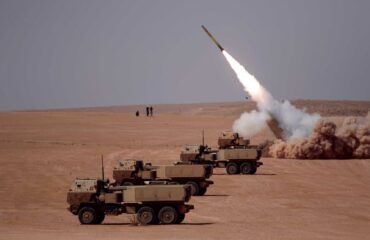Electric vehicles for military just “a mater of timeline”: BAE Systems Inc CEO

REAGAN NATIONAL DEFENSE FORUM: With the Biden administration’s focus on clean energy, the CEO of BAE Systems, Inc., told Breaking Defense recently he believes that the US military’s adoption of electronic vehicles for its vast fleet is inevitable.
“It’s a matter of timeline,” Tom Arseneault, CEO of BAE Systems, Inc., said in an interview at the Reagan National Defense Forum earlier this month.
Arseneault’s comments come amid a push by the Biden administration toward hybrid-electric vehicles to reduce the government’s carbon footprint and tackle climate change, including reducing emissions of the federal vehicle fleet and ending purchases of gas-powered cars by 2035.
The military trails behind the automotive industry in adopting electric or hybrid vehicles, but the Pentagon too is pushing for a net-zero emissions department by 2050. Deputy Secretary of Defense Kathleen Hicks said in November that includes a zero-emission non-tactical vehicle fleet.
Arseneault said for the DoD, “One of their largest expense items is fuel and so they recognize the logistics associated with that.”
Hicks said tactical vehicles initially will have to be hybrid, since there are logistical difficulties in charging vehicles in the field. But she also noted specific advantages electrified vehicles are expected to bring.
- “Electric vehicles are quiet,” Hicks said in the November speech. “They have a low heat signature, and incredible torque, and because they tend to be low maintenance with fewer moving parts, they have the potential to reduce logistics requirements. All […] these attributes can help give our troops an edge on the battlefield.”
- Arseneault said he believes the military will eventually adopt electric vehicles, even if DoD priorities change or when a new administration enters the White House in the future.
- “I think once the benefits of it are seen … the norms will change and we’ll see good uptake there,” he said.
Of course, BAE Systems has a keen interest in the military adoption of hybrid or electric technology. The company already makes hybrid-electric propulsion systems for civilian buses, boats and heavy-duty trucks. Currently, the company is working with the Army to integrate a hybrid-electric drive onto the BAE-made Bradley Infantry Fighting Vehicle.
“If this works, we would use this kind of technology and apply it as we look at our requirements for other vehicles in the future,” Stanley Darbro, deputy director of the Army RCCTO, told Breaking Defense in a Nov. 19 interview.
One of those areas is the Army’s electric Light Reconnaissance Vehicle, with an industry demo day concluded in May this year. Companies lining up for the Optionally Manned Fighting Vehicle competition have also signaled the inclusion of hybrid-electric drive.
Broadly, others in industry are also prioritizing electric vehicles. GM Defense, for instance, plans to profit from its parent company’s $35 billion investment in electric and autonomous vehicles, and recently developed a fully electric prototype of its Infantry Squad Vehicle.























